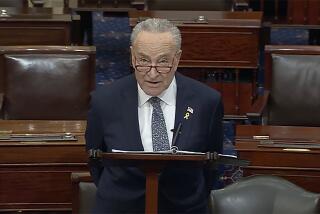Peres Backs Away From Israeli Cabinet Showdown
- Share via
JERUSALEM — Faced with certain defeat both in the Cabinet and the Parliament, Israeli Foreign Minister Shimon Peres on Wednesday backed away from a showdown with Prime Minister Yitzhak Shamir over a U.S.-brokered plan for Mideast peace negotiations.
Peres, who had demanded that the so-called inner Cabinet of senior government ministers approve the plan and threatened to withdraw from the coalition government if it did not, chose not to push the issue to a vote.
To do so would have been pointless, he told reporters after the three-hour meeting, because “the result was clear in advance.”
Shamir strongly opposed the plan, and the 10-man inner Cabinet is evenly split between ministers from the prime minister’s rightist Likud Bloc and Peres’ centrist Labor Alignment. A tie vote would have meant defeat for Peres.
Immediately after the inner Cabinet meeting, senior Labor officials decided despite the outcome to remain in the “national unity” coalition that has joined the two blocs since the inconclusive national elections of 1984.
Peres admitted that he did not have enough support among the smaller parties to win a parliamentary vote on dissolving the government. He said he was not willing to go into opposition if it meant turning over full power to Shamir and the right.
Peres made it clear that he will continue the fight, but the standoff was seen here as an embarrassing political defeat for him, at least for the short term. Diplomatic sources speculated that he had simply misread the political balance in the Knesset (Parliament) for new elections.
“When you threaten to bring down the government, you have to have divisions (troops) behind you,” an aide to Shamir said. “(Peres) went into the fight without the divisions.”
The stalemate is expected to bring on a period of even more rancorous political infighting. And it appeared to shatter whatever hope remained that a Mideast peace conference could be convened any time soon.
Months of U.S. mediation among the parties concerned had brought a proposal for a United Nations-sponsored international conference to the point where Israeli government approval became critical. But it now seems clear that such approval can come only if there are new elections and Peres wins enough of a mandate from the people to form a government.
But as long as Peres is unable to pressure Shamir into going to the voters, or to engineer a vote in the Parliament to dissolve itself, the next scheduled elections will not take place until November of 1988.
Peres’ Labor colleagues adopted an aggressively optimistic stance despite the apparent setback. Party Secretary Uzi Baram predicted that within two weeks, Labor will marshal the 61 votes needed to dissolve the Knesset and force new elections--a forecast most analysts considered extraordinarily optimistic in light of the current alignment of parliamentary forces.
Call for Shamir to Quit
As of Wednesday, it appeared that Peres could count on only 54 or 55 votes for new elections. Yet Labor’s Knesset faction called on Shamir to resign immediately, saying he is no longer “suitable to serve as prime minister of Israel.”
Peres said: “Honesty as well as responsibility calls upon all of us to turn to the people and ask them to decide. Since the government is divided equally, it is up to the people themselves to make the decision. The question is whether we should have an election campaign that’s 1 1/2 years long or three weeks long.”
Peres postponed for a day his departure on a previously scheduled visit to the United States in order to map political strategy. He is now scheduled to leave tonight for New York, where he is expected to meet with Secretary of State George P. Shultz over the weekend and return Monday.
Peres is expected to seek stronger Reagan Administration support for a peace conference in the hope that such support might help tip the domestic political scales in his favor. Washington, however, has been reluctant to do anything that might be interpreted as interfering in Israel’s internal affairs.
U.S. Role Resented
There is a definite but unmeasured undercurrent of resentment among Israelis at what they see as American highhandedness. Both sides are concerned that in the heat of an election campaign, some of that resentment might spill out in such a way as to seriously damage ties between the two countries.
U.S. officials have described the diplomatic moves that led to the proposal for an international peace conference as a sign of significant progress in the long-stalemated peace process. Peres has called the proposal a “historic opportunity” to end the Arab-Israeli conflict.
Peres’ plan calls for a conference to be attended by the five permanent members of the U.N. Security Council--the United States, Soviet Union, Britain, France and China--as well as Israel, Jordan and other Arab nations, plus Palestinian representatives.
But even if a framework for negotiations were approved, there would still be many potential stumbling blocks to the actual convening of a peace conference.
Shamir, who succeeded Peres as prime minister last October, halfway through the coalition government’s 50-month term, argued that Wednesday’s Cabinet stalemate means defeat for the peace conference plan and renders almost meaningless anything Peres might have to say about it in the United States.
“All of those who speak with Peres will know that when he talks about an international conference, he doesn’t speak in the name of the government,” Shamir said Wednesday night.
Sees No Need for Election
Asked why he refused to have new elections, Shamir replied: “There have been several crises in the past, and we weathered them without elections. If every whim led us to elections, how would we look?”
In a statement issued in the name of the government after the Cabinet meeting, Shamir’s spokesman, Avi Pazner, said:
“The idea of an international conference will not lead to peace and is designed, whether we like it or not, to force Israel into an array of pressures which only those interested in massive concessions could support. The obscurity enveloping this course is intended to enable the (Palestine Liberation Organization) to receive an entrance ticket to the conference and to the diplomatic process, and to enable other elements whose positions are totally opposed to those of Israel to prejudice the vital interests of the state.”
More to Read
Sign up for Essential California
The most important California stories and recommendations in your inbox every morning.
You may occasionally receive promotional content from the Los Angeles Times.













